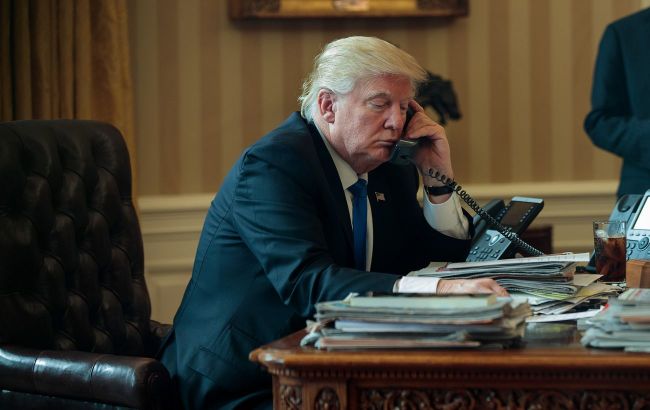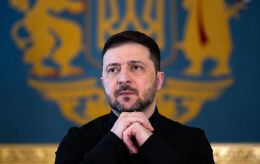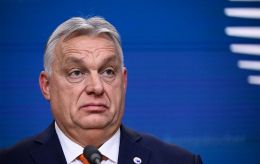Trump finally sees main obstacle to peace in Ukraine - WSJ
 Donald Trump (Photo: Getty Images)
Donald Trump (Photo: Getty Images)
US President Donald Trump's call for Vladimir Putin to stop attacks on Ukraine underscores the risky assumption he made in his pursuit of a quick end to the war. He thought the Kremlin wanted peace, The Wall Street Journal reports.
After three months, with virtually no results, Trump was forced to address Putin by name following the latest Russian missile strike on Kyiv. "Vladimir, STOP! 5000 soldiers a week are dying. Let's get the Peace Deal DONE!"
WSJ noted that Trump’s inability to stop the fighting after promising to do so quickly is increasingly frustrating and seemingly paralyzing him.
Now, the question is whether he is ready to pressure Moscow into making significant concessions to reach a deal, just as he pushed Ukraine. It’s a step that would jeopardize his broader goal of rapprochement with Russia, WSJ writes.
Trump insists that he is willing to give Russia and Ukraine only a little time to reach an agreement, before the US withdraws from aiding peace talks.
“We are thinking very strongly that they both want peace, but they have to get to the table,” Trump told reporters at the White House on April 24, adding that he has a certain deadline, which he does not disclose.
Trump's surprise
Although Trump has previously criticized Putin, such instances are relatively rare, and Trump’s aides say he has recently been genuinely surprised—and secretly irritated — that Putin has not shown more flexibility.
Trump directed his dissatisfaction at Ukraine rather than Russia because it was easier to influence, said Thomas Graham, a senior fellow at the Council on Foreign Relations. After a quarrel in the Oval Office between Trump and Zelenskyy in February, Trump briefly halted intelligence sharing with Kyiv and suspended military supplies.
Trump does not have many levers against Moscow that are easy to activate, Graham said. After Russia’s 2022 invasion, the US and its allies already imposed unprecedented sanctions on Russia, which has redirected its exports to new trading partners.
After his inauguration, Trump suggested that he might introduce additional sanctions on Russian oil exports if Putin resists a peace deal. But he did not mention this idea on Thursday, indicating that he believes Russia would do the West a favor by not capturing the rest of Ukraine.
Asked what concessions Putin offered in the negotiations, he replied: “Stopping the war. Stopping taking the whole country.”
Trump still does not show much willingness to contradict Putin. His belief that he can achieve a peace deal rests on his admiration for the Russian president, whose decision to invade Ukraine in 2022 he called “genius” and “smart.”
Witkoff’s trips
Trump’s envoy to Moscow now shares this personal sympathy Steven Witkoff, who is expected to make his fourth trip to meet Putin in the coming days. After his previous trips, he returned praising Putin’s behavior and stating that he considered a deal possible.
But Witkoff’s lack of experience in dealing with Russians may give Trump an overly rosy assessment of the chances for peace, Graham said. This may lead Trump to feel deceived, Graham said.
Graham, who served as a national security adviser on Russia to George W. Bush and frequently travels to Moscow, noted that earlier this year, Russians were concerned that Witkoff did not fully understand Russia’s demands regarding Ukraine.
Graham said there had been concerns that Witkoff might present Trump with a version of Russia's position that did not reflect its true stance and suggested that this might be happening now.
Moscow’s gains
Although Russia’s losses have been heavy, Putin has already achieved a number of concessions from the Trump administration, including signals that it is open to recognizing Crimea as part of Russia, excluding Ukraine from NATO, and accepting Russia’s de facto occupation of Ukrainian territories.
Trump’s actions have also weakened Moscow’s isolation from the West and sowed tensions in relations with US allies in Europe, who support a tougher stance on Ukraine.
“Russians see no reason to make a deal while they can gradually advance on the battlefield and get more concessions from the Americans,” said Eric Green, a former National Security Council aide in the Biden administration. “Why should they rush?”
Previously, Donald Trump stated the US is exerting “great pressure on Russia” to reach a peace deal. According to him, the next few days will be very important for negotiations on resolving the war.


